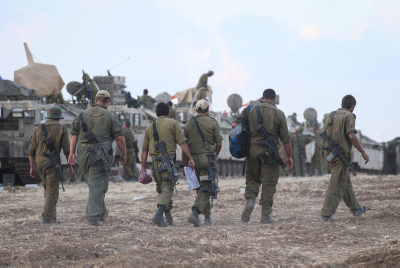How Channel 12 is insidiously trying to end the war
Godot's provocative critique of a recent Channel N12 report, which featured four reserve soldiers discussing their personal hardships, argues that such coverage is part of a hidden agenda to erode public support for the ongoing conflict, raising questions about the media's role in shaping perceptions of war and national security.

In the heart of Israel's ongoing conflict, a firestorm of controversy has erupted over the portrayal of reserve soldiers' struggles. At the center of this media maelstrom stands Aviad Godot, an outspoken commentator who's challenging the narrative with a provocative claim: what appears to be empathy may actually be poison.
Godot's fervent critique targets a recent Channel N12 report featuring four reserve soldiers. These warriors, now caught between battlefield and home front, laid bare their personal battles: careers derailed, academic dreams deferred, and family bonds strained to breaking point.
But beneath the surface of this seemingly compassionate coverage, Godot perceives a more insidious agenda. "The melody. The subtext. The conclusion that the media is trying to lead you to, perhaps without you noticing," he warns, painting a picture of a media landscape fraught with hidden motives.
According to Godot, this isn't just storytelling – it's strategic manipulation. He argues that by highlighting the war's grueling duration and the soldiers' sacrifices, the media is orchestrating a silent chorus of dissent. Their real message, he contends? "War is bad. Give us peace. End this already. The prices are too high."
In a scathing rebuke, Godot accuses the media of actively pushing for a premature end to the conflict. He suggests that by emphasizing the hardships faced by soldiers and their families, these reports are designed to erode public support for the war effort. "As if the State of Israel went to war to satisfy violent urges. As if there are no enormous threats," Godot writes, implying that the media's portrayal ignores the complex realities and security imperatives driving the conflict.
As Israel approaches the one-year mark of what Godot calls "a war of independence and identity," his words strike at the heart of a nation's resolve. He cautions against a creeping narrative that he believes could undermine the very foundations of Israel's security.
"If the conclusion is lamentation and crying and peace now - you've swallowed a toxic media pill," Godot declares, his words a rallying cry against what he sees as a dangerous shift in public opinion.
But is this a case of media manipulation, or simply journalists shining a light on genuine hardship? As this debate rages, it underscores the power of media in shaping perceptions of conflict – and the high stakes involved.
In a final, impassioned plea, Godot urges soldiers to stand firm not just on the physical battlefield, but on the cultural one as well. His message is clear: in the war of narratives, vigilance is key.
The only thing we know for certain is that the battle for hearts and minds is just as fierce as the one on the ground.